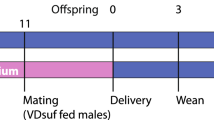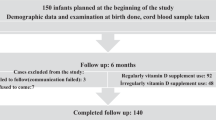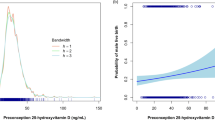Abstract
Background
For the second aim of the Kellogg Foundation grant, this double-blind RCT investigated the impact of plasma vitamin D metabolite 25-hydroxyvitamin D (25(OH)D) on plasma immune-mediators during pregnancy. We hypothesized that higher 25(OH)D concentrations would associate with reduced pro-inflammatory and increased tolerogenic immune-mediator concentrations.
Methods
Pregnant women enrolled at 10–14 weeks gestation were randomized to 400 or 4400 IU vitamin D3/day. Data on health, safety, circulating 25(OH)D, and 9 immune-mediators were collected at each trimester. Associations between immune-mediators and 25(OH)D at baseline and at second and third trimesters were examined.
Results
Baseline TGF-β and second and third trimesters IFN-γ and IL-2 were associated with baseline 25(OH)D. Baseline immune-mediators were associated with immune-mediators at second and third trimesters for all immune-mediators except IL-5 and IL-10. Race was associated with baseline TGF-β, VEGF and IL-10 and with IL-10 at second and third trimesters.
Conclusions
Both treatment groups had increased 25(OH)D at second and third trimesters, greatest in the 4400 IU group. Though associations between baseline 25(OH)D and baseline TGF-β and second and third trimester IFN-γ and IL-2 were noted, vitamin D supplementation throughout pregnancy did not impact immune-mediators at later trimesters. Supplementing with vitamin D before conception conceivably influences immune-mediator responses during pregnancy.
Impact
-
In this vitamin D supplementation clinical trial, baseline (first trimester) but not increasing plasma 25(OH)D concentration impacted select plasma immune-mediator profiles in pregnant women.
-
Baseline 25(OH)D was associated with baseline TGF-β and with IFN-γ and IL-2 at second and third trimesters.
-
Baseline IFN-γ, CRP, TGF-β, TNF-α, VEGF, IL-2, and IL-4 were associated with concentrations at second and third trimesters for respective immune-mediators; however, 25(OH)D concentration at second and third trimesters were not.
-
Some racial differences existed in immune-mediator concentrations at baseline and at second and third trimesters.
-
This study assesses the impact of vitamin D supplementation on multiple immune-mediators in pregnant women of different racial/ethnic groups using longitudinal data from a relatively large randomized controlled trial.
-
This study found that race was associated with baseline TGF-β, VEGF, and IL-10 and with IL-10 at second and third trimesters, a novel finding that sheds light where relationships were less well defined.
-
The results of this study suggest that vitamin D supplementation before conception or early in pregnancy, rather than during pregnancy, may be necessary to significantly impact immune-mediator response.
-
This study sets premise for future clinical trials to evaluate the effect of vitamin D supplementation before conception or prior to pregnancy.
Similar content being viewed by others
Log in or create a free account to read this content
Gain free access to this article, as well as selected content from this journal and more on nature.com
or
References
Hollis, B. W., Johnson, D., Hulsey, T. C., Ebeling, M. & Wagner, C. L. Vitamin D supplementation during pregnancy: double-blind, randomized clinical trial of safety and effectiveness. J. Bone Miner. Res. 26, 2341–2357 (2011).
Wagner, C. L. et al. A randomized trial of vitamin D supplementation in 2 community health center networks in South Carolina. Am. J. Obstet. Gynecol. 208, 137.e1–137.e13 (2013).
Wagner, C. L. et al. Health characteristics and outcomes of two randomized vitamin D supplementation trials during pregnancy: a combined analysis. J. Steroid Biochem. Mol. Biol. 136, 313–320 (2013).
Yılmaz, B., Aygün, C. & Çetinoğlu, E. Vitamin D levels in newborns and association with neonatal hypocalcemia. J. Matern. Neonatal Med. 31, 1889–1893 (2018).
Antonucci, R., Locci, C., Clemente, M. G., Chicconi, E. & Antonucci, L. Vitamin D deficiency in childhood: old lessons and current challenges. J. Pediatr. Endocrinol. Metab. 31, 247–260 (2018).
Ozdemir, A. A. & Cag, Y. Neonatal Vitamin D status and the risk of neonatal sepsis. Pak. J. Med. Sci. 35, 420–425 (2019).
Aletayeb, S. M. H., Dehdashtiyan, M., Aminzadeh, M., Malekyan, A. & Jafrasteh, S. Comparison between maternal and neonatal serum vitamin D levels in term jaundiced and nonjaundiced cases. J. Chin. Med. Assoc. 79, 614–617 (2016).
Herrera-Muñoz, A., Fernández-Alonso, A. M., Fischer-Suárez, N., Chedraui, P. & Pérez-López, F. R. Maternal serum cytokine levels in pregnancies complicated with threatened preterm labour. Gynecol. Endocrinol. 33, 408–412 (2017).
Velez, D. R. et al. Patterns of cytokine profiles differ with pregnancy outcome and ethnicity. Hum. Reprod. 23, 1902–1909 (2008).
Ragab, D., Soliman, D., Samaha, D. & Yassin, A. Vitamin D status and its modulatory effect on interferon gamma and interleukin-10 production by peripheral blood mononuclear cells in culture. Cytokine 85, 5–10 (2016).
Stoffels, K. et al. Immune regulation of 25-hydroxyvitamin-D3-1α-hydroxylase in human monocytes. J. Bone Miner. Res. 21, 37–47 (2005).
Ruiz, R. et al. Second trimester maternal plasma levels of cytokines Il-1Ra, IL-6 and IL-10 and preterm birth. J. Perinatol. 32, 483–490 (2012).
Szarka, A., Rigó, J., Lázár, L., Beko, G. & Molvarec, A. Circulating cytokines, chemokines and adhesion molecules in normal pregnancy and preeclampsia determined by multiplex suspension array. BMC Immunol. 11, 1–9 (2010).
Lau, S. Y. et al. Tumor necrosis factor-alpha, interleukin-6, and interleukin-10 levels are altered in preeclampsia: a systematic review and meta-analysis. Am. J. Reprod. Immunol. 70, 412–427 (2013).
Lygnos, M. C. et al. Changes in maternal plasma levels of VEGF, bFGF,TGF-β1, ET-1 and sKL during uncomplicated pregnancy, hypertensive pregnancy and gestational diabetes. In Vivo 20, 157–163 (2006).
Clausen, T. et al. Altered plasma concentrations of leptin, transforming growth factor-β1 and plasminogen activator inhibitor type 2 at 18 weeks of gestation in women destined to develop pre-eclampsia. Circulating markers of disturbed placentation? Placenta 23, 380–385 (2002).
Entringer, S. et al. Influence of prenatal psychosocial stress on cytokine production in adult women. Dev. Psychol. 50, 579–587 (2008).
Andersson, N. W. et al. Influence of prenatal maternal stress on umbilical cord blood cytokine levels. Arch. Womens Ment. Health 19, 761–767 (2016).
Irani, M. et al. Vitamin D decreases serum VEGF correlating with clinical improvement in vitamin D-deficient women with PCOS: a randomized placebo-controlled trial. Nutrients 9, 334 (2017).
Zhang, Y. et al. Vitamin D inhibits monocyte/macrophage proinflammatory cytokine production by targeting MAPK phosphatase-1. J. Immunol. 188, 2127–2135 (2012).
Heine, G. et al. 1,25-dihydroxyvitamin D 3 promotes IL-10 production in human B cells. Eur. J. Immunol. 38, 2210–2218 (2008).
Wei, R. & Christakos, S. Mechanisms underlying the regulation of innate and adaptive immunity by vitamin D. Nutrients 7, 8251–8260 (2015).
Barker, T. et al. Supplemental vitamin D increases serum cytokines in those with initially low 25-hydroxyvitamin D: a randomized, double blind, placebo-controlled study. Cytokine 71, 132–138 (2015).
Jeffery, L. E. et al. 1,25-Dihydroxyvitamin D3 and IL-2 combine to inhibit T cell production of inflammatory cytokines and promote development of regulatory T cells expressing CTLA-4 and FoxP3. J. Immunol. 183, 5458–5467 (2009).
Gubatan, J. et al. Higher serum vitamin D levels are associated with protective serum cytokine profiles in patients with ulcerative colitis. Cytokine 103, 38–45 (2018).
Vijayendra Chary, A. et al. Vitamin D deficiency in pregnant women impairs regulatory T cell function. J. Steroid Biochem. Mol. Biol. 147, 48–55 (2015).
Cantorna, M., Snyder, L., Lin, Y.-D. & Yang, L. Vitamin D and 1,25(OH)2D regulation of T cells. Nutrients 7, 3011–3021 (2015).
Liao, S. et al. Maternal vitamin D level is associated with viral toll-like receptor triggered IL-10 response but not the risk of infectious diseases in infancy. Mediators Inflamm. 2016, 1–8 (2016).
Hornsby, E. et al. Vitamin D supplementation during pregnancy: effect on the neonatal immune system in a randomized controlled trial. J. Allergy Clin. Immunol. 141, 269.e1–278.e1 (2018).
Chandler, P. D. et al. Impact of vitamin D supplementation on inflammatory markers in African Americans: results of a four-arm, randomized, placebo-controlled trial. Cancer Prev. Res. 7, 218–225 (2014).
Gillespie, S. L., Porter, K. & Christian, L. M. Adaptation of the inflammatory immune response across pregnancy and postpartum in Black and White women. J. Reprod. Immunol. 114, 27–31 (2016).
Newton, D. A. et al. Vitamin D binding protein polymorphisms significantly impact vitamin D status in children. Pediatr. Res. https://doi.org/10.1038/s41390-019-0322-y (2019).
Jefferson, K. K. et al. Relationship between vitamin D status and the vaginal microbiome during pregnancy. J. Perinatol. https://doi.org/10.1038/s41372-019-0343-8 (2019).
Ozkan, Z. S. et al. Plasma IL-17, IL-35, interferon-γ, SOCS3 and TGF-β levels in pregnant women with preeclampsia, and their relation with severity of disease. J. Matern. Neonatal Med. 27, 1513–1517 (2014).
Yusupov, E. et al. Vitamin D and serum cytokines in a randomized clinical trial. Int. J. Endocrinol. 2010, 305054 (2010).
Scott, M. G., Davidson, D. J., Gold, M. R., Bowdish, D. & Hancock, R. E. W. The human antimicrobial peptide LL-37 is a multifunctional modulator of innate immune responses. J. Immunol. 169, 3883–3891 (2002).
Mitchell, C., Gottsch, M. L., Liu, C., Fredricks, D. N. & Nelson, D. B. Associations between vaginal bacteria and levels of vaginal defensins in pregnant women. Am. J. Obstet. Gynecol. 208, 132.e1–132.e7 (2013).
Perry, L. M. et al. Differences in total and allergen specific IgE during pregnancy compared with 1 month and 1 year post partum. Ann. Allergy Asthma Immunol. 103, 342–347 (2009).
Hohlagschwandtner, M. et al. Basic fibroblast growth factor and hypertensive disorders in pregnancy. Hypertens. Pregnancy 21, 235–241 (2002).
Mirzakhani, H. et al. Early pregnancy vitamin D status and risk of preeclampsia. J. Clin. Invest. 126, 4702–4715 (2016).
Litonjua, A. A. et al. Effect of prenatal supplementation with vitamin D on asthma or recurrent wheezing in offspring by age 3 years. JAMA 315, 362 (2016).
Wolsk, H. M. et al. Vitamin D supplementation in pregnancy, prenatal 25(OH)D levels, race, and subsequent asthma or recurrent wheeze in offspring: secondary analyses from the Vitamin D Antenatal Asthma Reduction Trial. J. Allergy Clin. Immunol. 140, 1423.e5–1429.e5 (2017).
Van Dyke, A. L., Cote, M. L., Wenzlaff, A. S., Land, S. & Schwartz, A. G. Cytokine SNPs: comparison of allele frequencies by race and implications for future studies. Cytokine 46, 236–244 (2009).
Hoffmann, S. C. et al. Ethnicity greatly influences cytokine gene polymorphism distribution. Am. J. Transplant. 2, 560–567 (2002).
Hassan, M. I., Aschner, Y., Manning, C. H., Xu, J. & Aschner, J. L. Racial differences in selected cytokine allelic and genotypic frequencies among healthy, pregnant women in North Carolina. Cytokine 21, 10–16 (2003).
Liu, N. Q. et al. Vitamin D-deficiency and sex-specific dysregulation of placental inflammation. J. Steroid Biochem. Mol. Biol. 177, 223–230 (2018).
Denney, J. M. et al. Longitudinal modulation of immune system cytokine profile during pregnancy. Cytokine 53, 170–177 (2011).
Chun, R. F. et al. Vitamin D-binding protein directs monocyte responses to 25-hydroxy- and 1,25-dihydroxyvitamin D. J. Clin. Endocrinol. Metab. 95, 3368–3376 (2010).
Acknowledgements
We thank Patrick Simpson, MS, of the W. K. Kellogg Foundation and Myla D. Ebeling, data manager in the Department of Pediatrics at the Medical University of South Carolina (MUSC), for their support during the conduct of this study. We also thank the women who participated in this study, without whose participation we could not have learned what we did. We also are thankful to Church & Dwight, Inc. (Princeton, NJ), who provided the vitamin D and placebo gummies for this study. This publication was also supported, in part, by the W. K. Kellogg Foundation Grant P3020828, “Preventing Health Disparities during Pregnancy through Vitamin D supplementation” and the South Carolina Clinical & Translational Research Institute (SCTR), MUSC’s Clinical and Translational Science Awards Hub, NIH/NCRR Grant Number 1UL1TR001450. The contents are solely the responsibility of the authors and do not necessarily represent the official views of the Kellogg Foundation, NIH, or NCRR.
Author information
Authors and Affiliations
Contributions
Conception and design: C.L.W., J.K.M., J.R.S., M.H., J.E.B., D.A.N., B.H.W. Acquisition of the data: J.K.M., J.R.S., J.E.B., D.A.N., C.L.W. Analysis and interpretation of data: A.K., B.J.W., J.K.M., M.H., J.E.B., D.A.N., C.H., C.L.W. Drafting the article/revising important intellectual content: A.K., B.J.W., J.K.M., J.R.S., M.H., J.E.B., D.A.N., C.H., C.L.W. Final approval of version to be published: all authors.
Corresponding author
Ethics declarations
Competing interests
The authors declare no competing interests.
Patient consent
Patient consent was required for this study, and all participants provided written, informed consent prior to their enrollment in the study.
Additional information
Publisher’s note Springer Nature remains neutral with regard to jurisdictional claims in published maps and institutional affiliations.
Supplementary information
Rights and permissions
About this article
Cite this article
Khatiwada, A., Wolf, B.J., Mulligan, J.K. et al. Effects of vitamin D supplementation on circulating concentrations of growth factors and immune-mediators in healthy women during pregnancy. Pediatr Res 89, 554–562 (2021). https://doi.org/10.1038/s41390-020-0885-7
Received:
Revised:
Accepted:
Published:
Version of record:
Issue date:
DOI: https://doi.org/10.1038/s41390-020-0885-7



